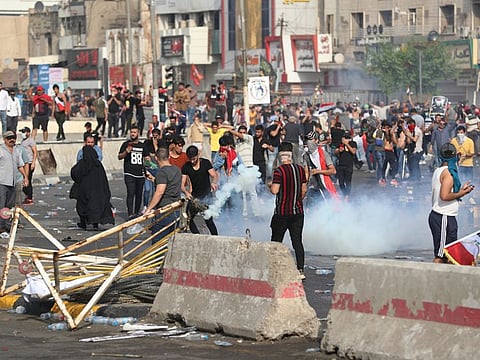Explainer: What is driving anti-government protests in Iraq?
Government under fire for using ‘excessive force’ in what is now known as Bloody Tuesday

Also In This Package
Damascus: Tuesday’s violent crackdown against unarmed protesters in central Baghdad puts Prime Minister Adel Abdul Mehdi in a very critical position, threatening to bring down his government on the very first anniversary of its formation.
Iraqi analysts of all stripes and colours seem to agree that the peaceful demonstrators who took to the streets of the Iraqi capital were expressing legitimate concerns, ranging from the improvement of government services to fighting corruption and finding jobs for the unemployed.
What took people aback and led to public uproar was the excessive use of force, as riot police used live ammunition, tear gas, and water pumps to disperse the young people, many being university graduates, trying to cross a bridge over the Tigris River to reach the Green Zone from Tahrir Square.
The ministries of health and interior claim that only two people were killed last Tuesday, and 286 were wounded, 40 of them from the police.
Online activists insist, however, that at least 20 people have died so far, all from the demonstrators.
Who is behind the protests?
The protests seem to be coming from a genuine public frustration at the establishment with no clear leader.
“The demonstrations have no single demand and are organised by no single authority,” said Iraqi political science professor Ayad Anber of the University of Kufa.
“This is a point in their favour,” he said to Gulf News, adding that the young demonstrators who took to the streets had “liberated themselves” from the tutelage of political parties and their leaders, who had hijacked previous demonstrations.
Prominent political analyst Abdulkader Alnael says the protests were well-organised by “Coordination Committees” composed of academics, university graduates, youth movements, and tribal leaders.
The same committees had staged anti-government protests as early as February 2011, long before emergence of Daesh.
What are the protesters demands?
“People have an endless list of very legitimate demands,” he said to Gulf News, “like the slump in health services, educational collapse, unemployment, spread of illegal arms in cities, kidnapping, assassinations, sectarian distribution of power, and Iranian tutelage in Iraq.”
They were also angry after the removal of a top military commander from his post.
Prime Minister Adel Abdul-Mahdi removed Lt. Gen. Abdul-Wahab al-Saadi from his post as the commander of the country’s elite counterterrorism forces and transferred him to the Defense Ministry on Friday, without providing an explanation.
The decision sparked speculation that some among Iraq’s Iran-backed politicians were uneasy with the commander’s growing popularity among Iraqis.
“The young people sent a clear message to the Abdul Mehdi government, saying that Iraq was heading towards the abyss, but seemingly, nobody was willing to listen to them, neither in the government nor in the political community or among the armed groups like the Popular Mobilisation Units (PMU).”
What role are the Iraqi youth playing?
A major role. After complaining for years without any results, an online hashtag #Nazel akhod Haki (Protesting for my rights) started calling for mass demonstrations on October 1.
“Young people finally decided to act in a nationalist manner, taking matters into their hands while carrying nothing but Iraqi flags.”
“It’s inconceivable that 83,000 foreigners are employed in Iraq when Iraqi youth cannot find jobs,” Alnael said.
“People simply cannot remain silent over the closure of more than 10,000 factories, which are capable of providing 500,000 jobs, at a time when poverty has crossed the 50 per cent mark.”
How have political heavyweights reacted?
Prominent Iraqi players, like the Communist Party and Muqtada Al Sadr, refused to join the protests, but have called for investigation into excessive violence of the security services.
So did Abdul Mehdi himself, who released an official statement on Tuesday, saying that committees were established to address popular grievances.
He refused to condemn the security forces, however, describing them as “heroes” while saying that “unpeaceful demonstrators” had infiltrated the crowd, “raising slogans punishable by law, threatening order and social peace.”
Those demonstrators, he added, had “stabbed our forces with knives and burnt them with grenades.”
The entire episode “saddens us deeply and bleeds our hearts.”
“Some parties are indeed trying to manipulate the popular demonstrations, raising the bar of their political demands in order to bring down the regime,” said Wathiq Al Jabery, a consultant at the Iraqi Media Development Center.
“It seems that some regional and foreign players don’t want Iraq to stabilise or to regain its position as a strategic and neutral power in international conflicts,” he told Gulf News.
Has the crackdown backfired on the government?
Yes. The astonishing violence has added fuel to the protesters’ ire. Blood has been spilled at now the demonstrators want justice.
“By cracking down on the people, the government has lost the last thread of legitimacy that it enjoyed. In the past, people had been willing to give it the benefit of the doubt, but not anymore. On social media networks, we are now starting to hear demands for its resignation," Anber said.




